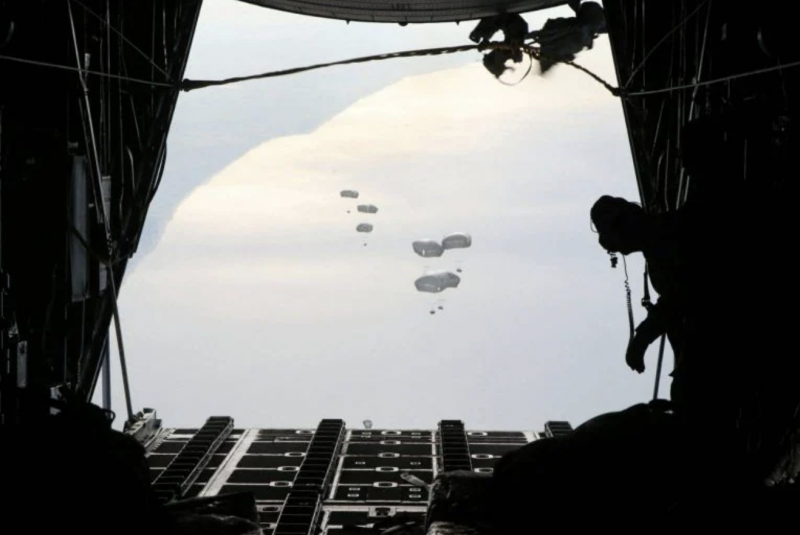
Humanitarian aid dropped over the Gaza Strip, in cooperation with France, on Feb. 26. (Credit: Jordanian Armed Forces /Handout via Reuters)
An operation by the Jordanian army and France to drop food aid parcels over the Palestinian enclave has been the subject of controversy on social networks, with many Internet users denouncing the fact that these parcels, or at least some of them, fell into the sea and should have been sent to the north of the territory.
According to a statement issued on Monday by the Jordanian army, the parcels sent to Gazans included pre-prepared rations of high nutritional value "to alleviate the suffering of the enclave's inhabitants.”
Internet users shared hundreds of impressive videos of the drop over beaches, in which men and young children can be seen gathering to retrieve the packages that fell into the water.
"There are cookies and a glass with a sachet of coffee," rejoiced a youngster who had just opened a package to the applause of his companions. Some of the children chanted Jordan's name in thanks.
Other videos showed a crowd on the beach, with planes launching parcels in the background, or Gazans holding packets of food rations covering an entire day's meals, including portions of rice and chicken.
This aid distribution was criticized by some Internet users because many of the packages landed in the water. One X platform user wrote: "They threw them for the fish."
Why did the packages fall into the sea?
Dropping parcels over the sea "is not the ideal way to send humanitarian aid, but right now the needs are so great that any help is welcome, whatever it may be,” May Sayegh, communications director for the International Federation of Red Cross and Red Crescent Societies (IFRC) in the MENA region, told L'Orient-Le Jour. "The needs are enormous and we are calling for aid to be brought into Gaza as quickly as possible,” she added.
According to information from retired Lebanese general Khalil Helou, this "unusual" operation was carried out for political and security reasons: "The Jordanians initially wanted to drop aid over the enclave, but they preferred to do it at sea level because the operation was carried out without the agreement of the Israelis."
"To launch packages, Jordanian planes had to fly at low altitude, and they didn't want to do it in hostile territory [within the war-torn enclave]. So they chose the sea, even though it's not an operation that's usually carried out that way," explained Helou.
‘The law of the strongest’
The location of the airdrop, in the center of the Gaza Strip, also caused a stir.
A Gazan YouTuber who filmed and broadcast the entire scene denounced an operation that benefited only a few. According to him, some coastal residents got their hands on the majority of the packages recovered. "Unfortunately, some people seized the [Jordanian] aid by force. No displaced persons, especially from northern Gaza, had access to it ... It's no use distributing aid in this way. I'm sorry to say so, but that's the reality of the situation. The situation is very difficult, and the law of the strongest prevails," he continued.
Gazan journalist Bisan Owda called on Instagram to "feed the people of the North ... who are dying of hunger.”
"Most of the inhabitants have had nothing. We call on Jordan and the Arab and Islamic regimes to come to the aid of Gaza, especially the northern part, by supplying flour so that they can make bread, instead of sending them light meals,” wrote the Yemeni website al-Hawiya, citing Palestinian sources.
According to figures provided by the IFRC, the number of humanitarian aid trucks authorized to enter the Palestinian enclave, carrying medicines, food, drinking water and blankets, fell drastically in February.
"We went from 135 trucks a day in January to around 60 in February, and sometimes even to 10 authorized trucks, while needs are constantly increasing," said Sayegh.
"People are eating grain normally reserved for livestock or plants they find in nature. Flour is very expensive and almost impossible to find,” she added, pointing out that "a pack of baby diapers now costs 55 dollars in Gaza.”
This article was originally published in L'Orient-Le Jour. Translated and edited by Yara Malka.